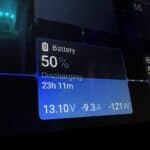
MENUMENU
TALK TO AN EXPERT
Special Hours: 7AM – 6PM PST
TALK TO AN EXPERT
Special Hours: 7AM – 6PM PST
When it comes to 12-volt (12V) house batteries, choosing the right one can seem a little daunting to those unfamiliar with battery technology. While all 12V battery types provide power for 12V electrical systems, there are notable distinctions in the design, capacity, maintenance needs, and expenses associated with the different options. We’ll discuss the factors you need to consider when determining which 12V battery is right for you!
Just like other types of batteries, 12V batteries utilize cells to produce a chemical reaction that generates an electron flow in a circuit. They do not have the ability to create power on their own but simply store energy for you to use later.

The power that 12V batteries produce is classified as direct current (DC) power. DC power is a linear electrical current used to power many types of electrical devices. While direct current power delivers consistent voltage, alternating current (AC) power, which comes from power outlets, exhibits periodic changes in current. Although AC power is less steady, it can travel much farther due to its wave-like motion and is used by a variety of household appliances. If needed, an inverter can convert DC power into AC power to run these household appliances.
Multiple 12V batteries can be connected in series or in parallel to get either a higher voltage or more storage capacity, depending on the configuration. For example, if connecting two 12V batteries in series, you will create a 24V system. Conversely, connecting the same 12V batteries in parallel will create a 12V system, but it will be able to power the same devices for twice as long as a single 12V battery.
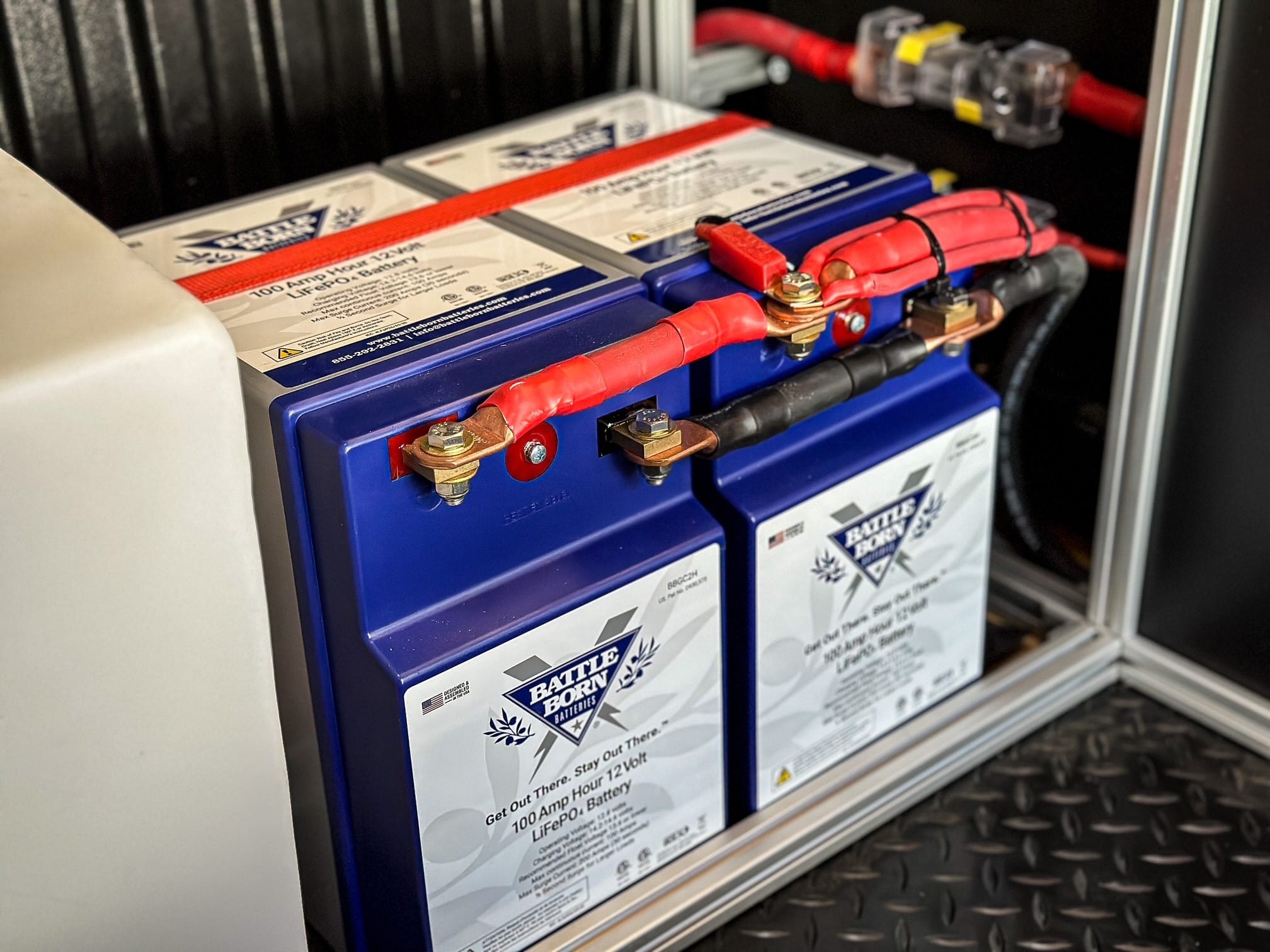
While some 12V batteries are used for starting applications, other 12V batteries are used in RV, van, and marine systems as deep cycle house batteries. The primary chemistries of 12V batteries are lead-acid and lithium-ion.
While lithium-ion is a newer technology, lead-acid batteries have traditionally been used for energy storage in RVs and other applications. Lead-acid batteries are the most basic 12V battery type. They’re made of lead plates suspended in a sulfuric acid solution, which creates a chemical reaction that allows for energy to be stored. There are four main types of lead-acid batteries.
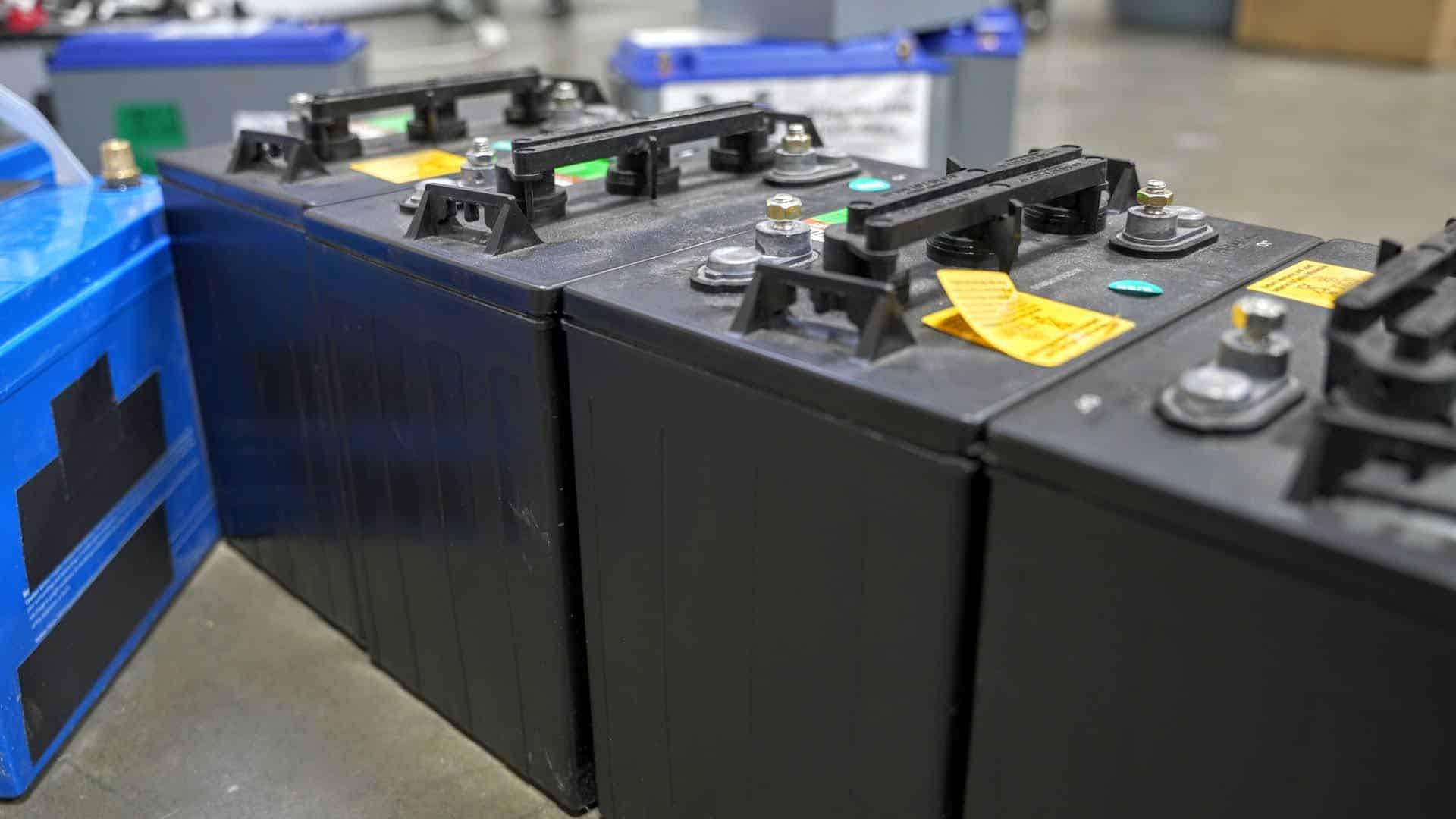
Flooded Lead-Acid batteries are the most common type of lead-acid battery. In order to keep them functioning correctly, it is critical that they maintain the proper water ration. This requires periodic maintenance to monitor the battery and ensure it is operating optimally. Flooded lead-acid batteries generally last 2 to 5 years, depending on use and frequency of maintenance. Their cost can vary widely, but it is typically around $100
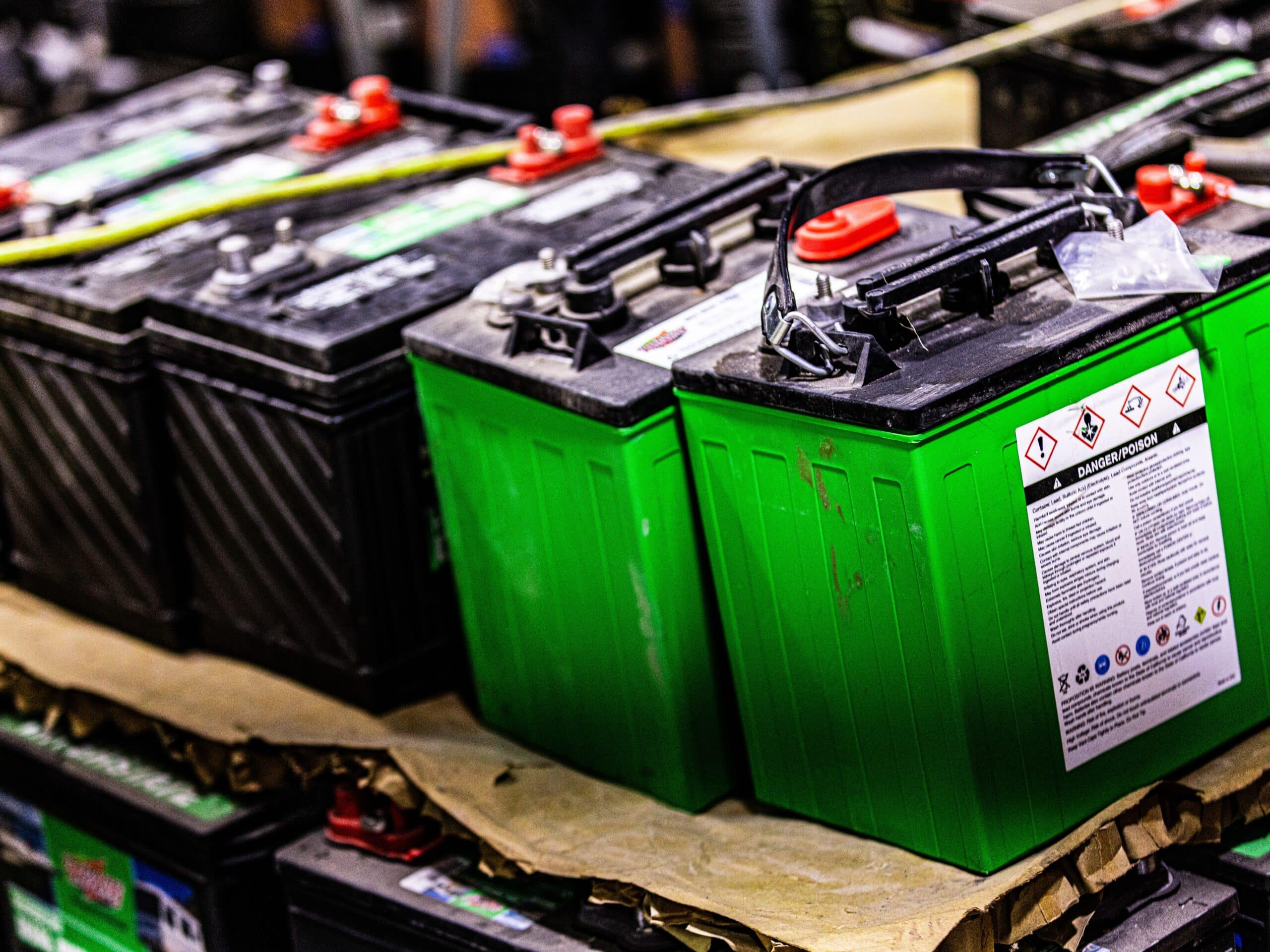
Since these are the most common kind of batteries, they’re also the most readily available and cheapest upfront to replace when the time comes. This type of battery also does not have any electronics in it and can produce a large current for a short period. This makes them ideal for starting batteries in vehicle engines.
Because these batteries need a specific amount of fluid in them to operate properly, you’ll need to be comfortable maintaining your battery system every 3-6 months. This can be difficult, depending on where your batteries are located in your RV.
Flooded lead-acid batteries also have the shortest overall lifespan of the main battery types and can be negatively affected by extremely hot or cold temperatures. You must also install them in an upright position, or they will leak water and acid and fail.
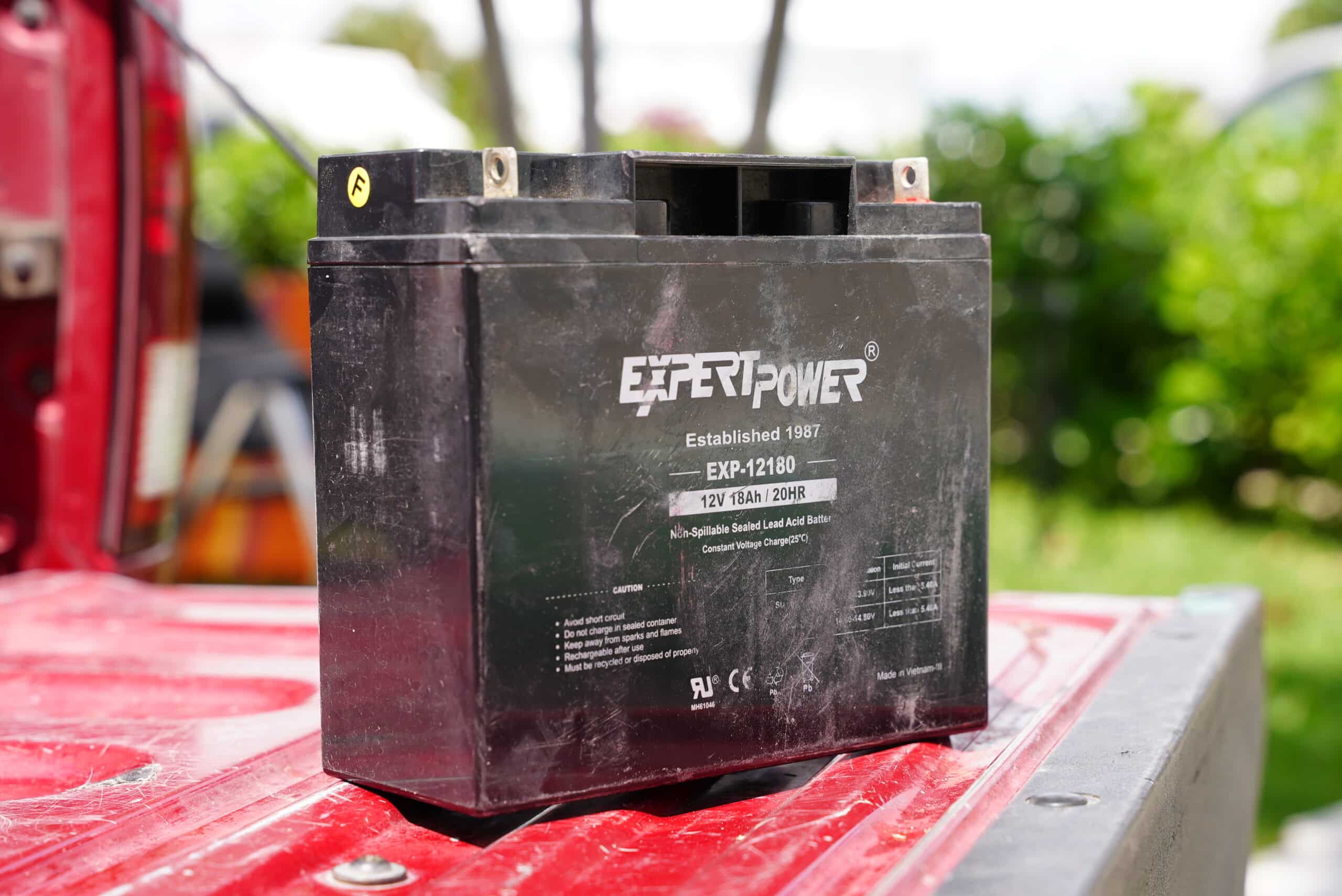
Sealed valve-regulated lead-acid (VRLA) batteries eliminate many of the maintenance needs of their flooded counterparts. As their name implies, they’re sealed shut and contain all the necessary components to run throughout the life of the battery.
Since they are sealed, as they discharge the chemical reaction creates hydrogen gas that builds up within the battery. Typically, this gas is produced at a slow enough rate that allows it to combine to turn back into water in the battery, but during rapid charges or discharges, the gas pressure can exceed the battery’s safety specs. A regulator valve is installed to relieve any excessive pressure but, unfortunately, can slowly decrease the capacity of the battery if used too often.
VRLA batteries are reasonably easy to find and last between 2 and 8 years, depending on usage. They typically cost between $200-$300.
With no maintenance required, these batteries are relatively hassle-free. While they’re more expensive than flooded lead acid batteries, they’re still among the most budget-friendly battery options.
Even a slight price increase could turn off many cost-conscious buyers. Additionally, the inability to maintain the battery may result in less-than-optimal performance over their life as gas leaks through the regulator valve. A properly maintained flooded lead-acid battery will outlast a sealed battery, but a poorly maintained flooded battery will have a shorter lifespan than a VRLA battery.
Gel batteries are considered a type of VRLA battery and suspend their lead plates inside a thicker gel instead of a liquid solution. These batteries generally last between 2-5 years and cost anywhere from $100-$900. The cost typically goes up as the capacity of the battery increases.
Gel batteries don’t require any regular maintenance and don’t have any liquid that could potentially leak out. This allows them to be installed in a variety of orientations. They also work well in high temperatures, unlike other types of lead-acid batteries. This makes them a good option for special use cases or as high-temperature starting batteries for engines.
Gel batteries need more care when charging to ensure they’re not damaged. They require a particular type of charge controller and need slower charging cycles at lower voltages. This leads to an increased cost of the overall system beyond just the price of the batteries. Like other lead-acid types, deep discharges and fast recharge potentially damage these batteries.
Absorbent Glass Mat (AGM) batteries are a type of sealed lead-acid battery. The lead plates sit between fiberglass-saturated electrolyte mats. This allows increased efficiency in discharging and recharging. AGM batteries usually last between 4-7 years and cost around $200.
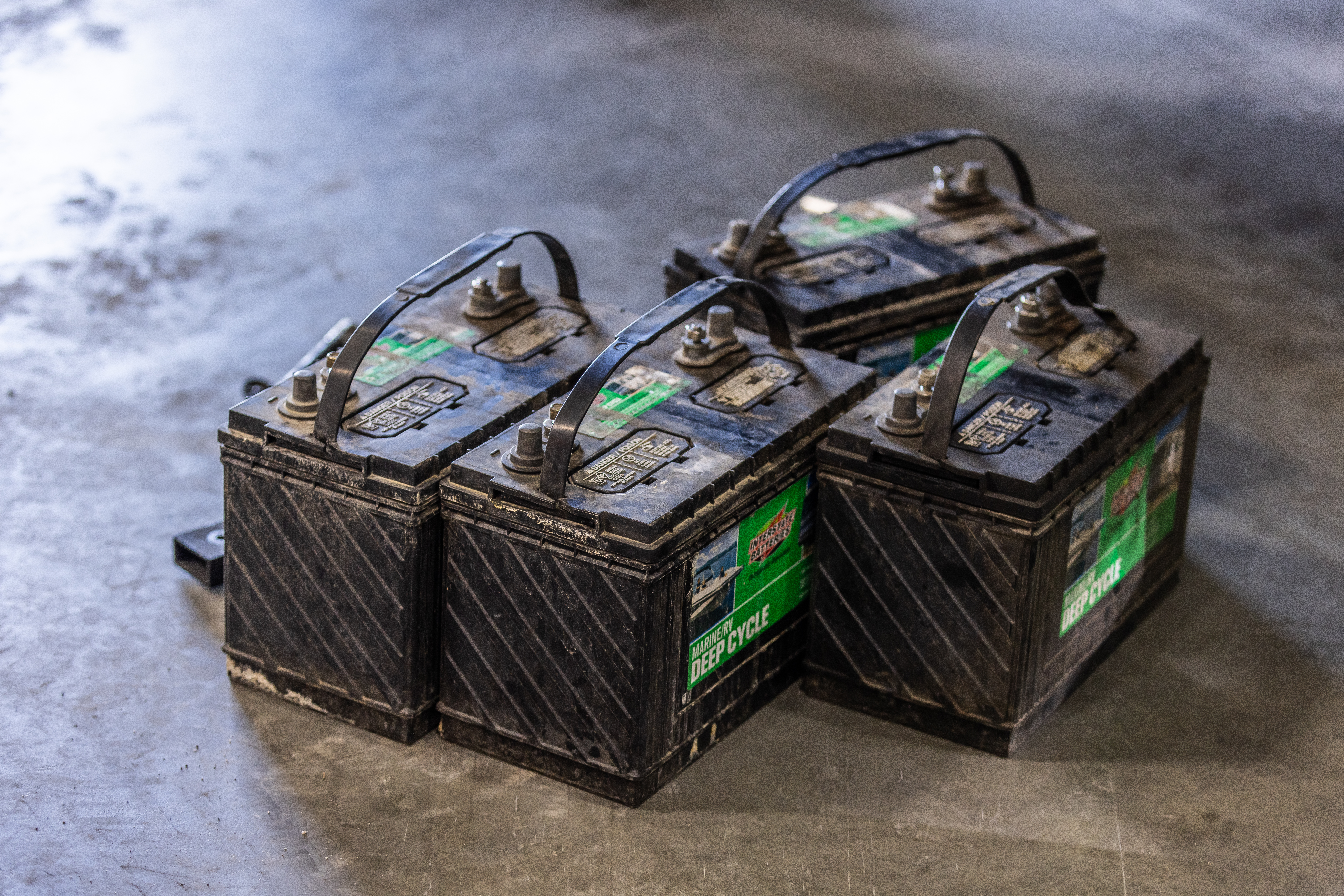
AGM batteries don’t require any regular maintenance, don’t leak, and work well in most temperatures. They also don’t require the special charging equipment and maintenance that is needed with other types of lead acid batteries and tend to have a longer lifespan.
AGM batteries can be significantly more expensive than traditional lead-acid or gel batteries with similar capacities. These batteries require specific charging levels and can easily be overcharged at high voltages. Additionally, AGM batteries require full charges in between uses, limiting their usability after only one use.
All lead-acid battery types have strict usage and charging requirements that must be followed closely to ensure their lifespan is not shortened. Monitoring discharge and charge levels is essential as deep discharges and partial charges will damage the battery. Lead acid batteries also have long recharge times and need a special absorption charge cycle to be fully charged. These limitations make lead-acid batteries a poor choice for applications that involve frequent charge and discharge cycles, like renewable energy power applications.
Lithium-ion batteries are a relatively new technology and are currently the most expensive type of 12V battery. However, they offer many advantages for those willing to upgrade. Unlike their lead-acid counterparts, lithium-ion batteries work using lithium electrolytes to create more efficient electricity storage and with lighter-weight materials. Depending on the component quality and manufacturer, 12V lithium-ion batteries can cost from $300 –$900 each.
Lithium-ion batteries have the highest storage capacity of all 12V battery types and have the fastest and most efficient charging. They also last the longest before needing to be replaced, even 3-5 times longer than traditional lead-acid batteries. Lithium-ion batteries are lighter and don’t require the regular maintenance that other types of batteries do. Since lithium-ion batteries are sealed and don’t require venting, they can be installed anywhere in any orientation.
Additionally, lithium-ion batteries can discharge more of their stored energy without damaging the battery or reducing their power, unlike lead-acid batteries. This ensures the battery can be used to its full potential for its full lifespan. With these charging benefits, lithium-ion batteries perform very well in solar power systems that create repetitive and partial charging cycles, which is beneficial for RV use.
Lithium-ion batteries have the most expensive up-front costs of 12V battery types. Since this technology is newer, some systems may require more components and accessory upgrades to accommodate a lithium-ion battery system. Lithium-ion batteries also limit the current and are not approved for cold-cranking amps (CCA), so they will not work as an engine-starting battery.
Although lithium-ion batteries have higher initial costs, they last much longer than lead-acid batteries, creating cost-savings over the battery’s life. Additionally, lithium-ion batteries are created with internal battery management systems (BMS) to protect both the user and the battery. Overall, lithium-ion batteries are a much safer and economically viable option than lead-acid alternatives.
Picking the best 12V battery type for you is about trade-offs and determining how and where you plan to use your battery. Each battery type has advantages and disadvantages, which can vary in importance depending on your style of travel.
The RVer on a tight budget may go for cheaper flooded lead-acid batteries, even if the long-term cost is more. Those who often operate in very hot or cold temperatures may want to avoid lead-acid batteries and lean towards a lithium-ion battery that will protect itself and perform better in extreme conditions. Gel batteries eliminate some of these issues but require more costly, additional charging requirements.
RVers looking for low-maintenance batteries should consider lithium-ion or sealed lead-acid batteries. For those looking to invest more upfront in return for long-term cost-savings and more reliable power, lithium-ion batteries are a great option.
The optimal mix of safety components, low maintenance requirements, charging and space efficiency, long lifespans, and sustainability of lithium-ion batteries make them the best overall choice.
At Battle Born Batteries, we offer a wide range of 12V lithium iron phosphate (LiFePO4) batteries so that no matter what your application or power requirements are we have an option for you!
Our flagship lithium battery is the standard 12V 100Ah Battle Born Battery. It is the perfect battery to enhance your adventure life! This battery is compatible with various RV, marine, van, and off-grid systems. This battery offers 3,000-5,000 lifecycles and a continuous current of 100 amps, with a 200 amp surge current (30 seconds), and a half-second surge for higher loads, giving you plenty of power no matter where the road takes
The Battle Born GC2 Battery offers the same power as our standard 12V 100Ah LifePO4 battery, just in a different form factor. The GC2 has a narrower format and is a drop-in replacement for a traditional lead acid, 6 V GC2 batteries with 2x-3x the power, 1/5th the weight, and ten times longer lifespan.
Expanding on the power capacity of our 12V 100Ah batteries, we created the Battle Born GC3 Battery. Aptly named the “Gamechanger”, this battery delivers an impressive amount of power. This high-capacity battery boasts 270Ah and will exceed your expectations no matter where you utilize it. Whether using it in an RV, on an off-grid property, or on the water, it is guaranteed to perform exceptionally well.
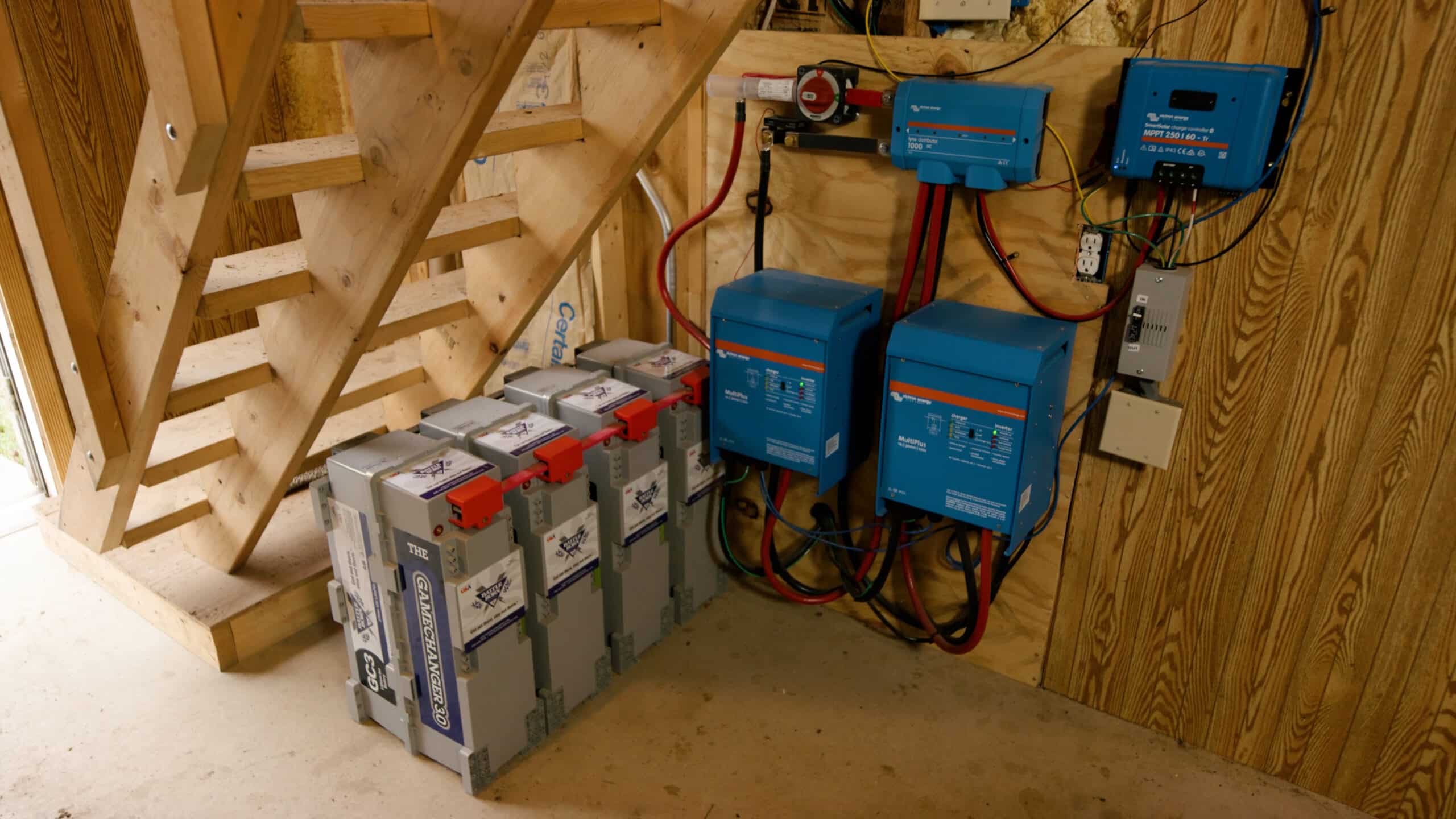
With its versatile mounting options, the GC3 maximizes space efficiency. You can install them vertically, enabling you to fit three batteries in a space typically occupied by just one standard 8D battery.
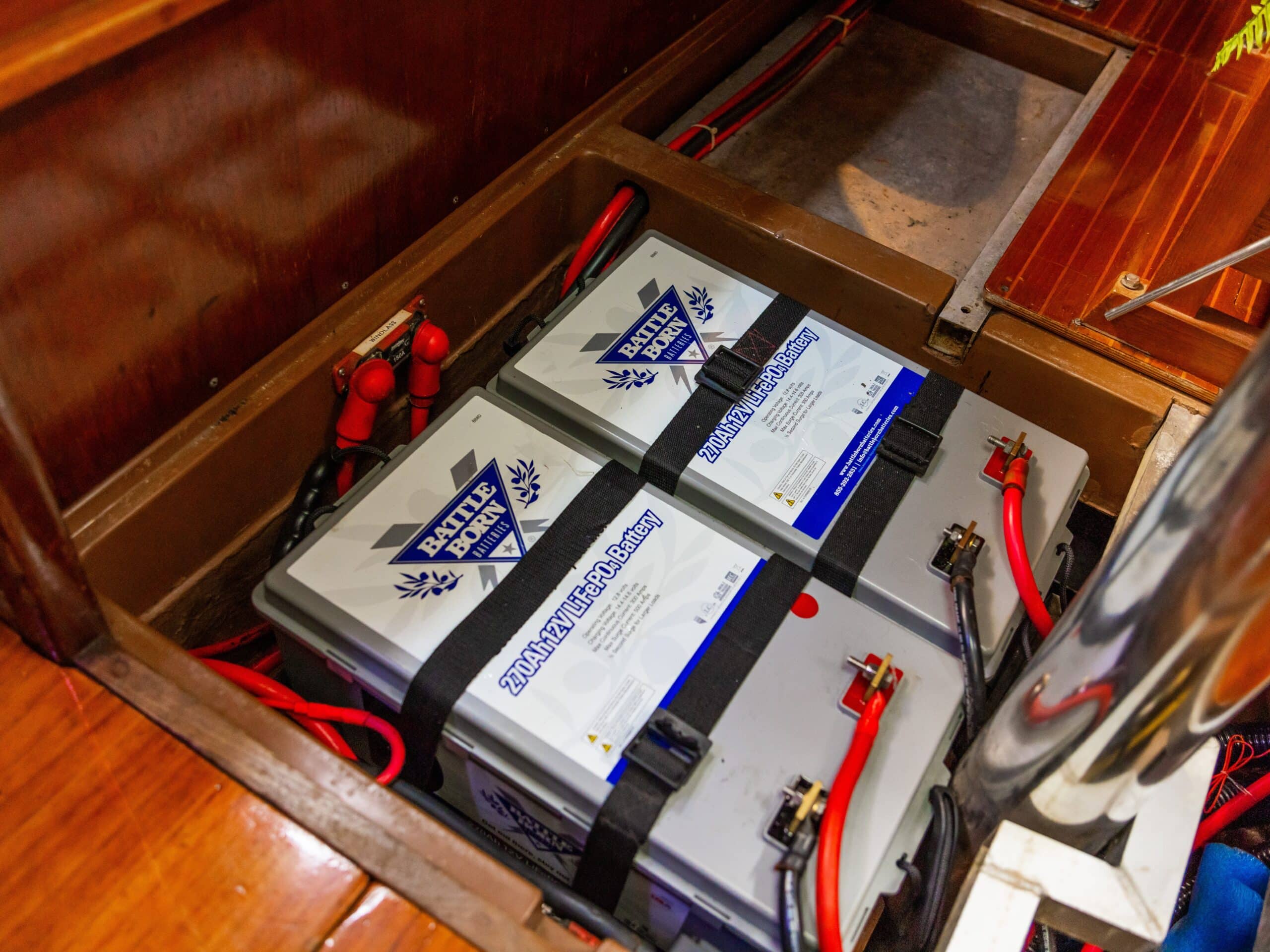
The Battle Born 270Ah 12V 8D is perfect for marine and off-grid purposes as it is a direct drop-in replacement for traditional lead-acid 8D batteries. But, with 5x faster charging and a 100% depth of discharge, ensuring minimal downtime and maximum efficiency. Additionally, the Battle Born 8D Battery weighs roughly 80 lbs – over 50 lbs lighter than a standard lead-acid 8D!
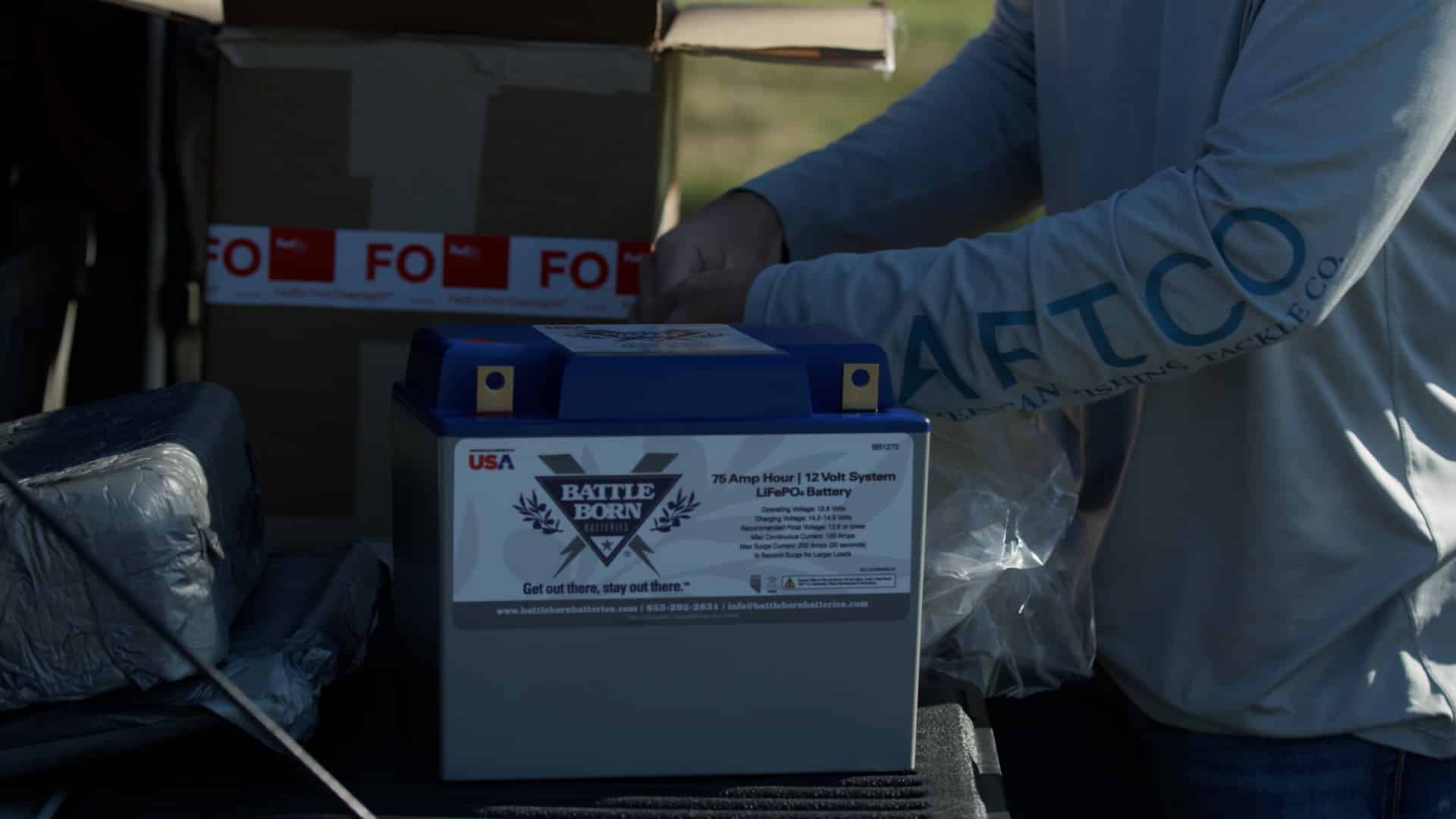
The Group 24 form factors have existed for years, but our 50Ah Group 24 battery and 75Ah Group 24 battery completely optimize how your battery and system function. Whether you’re seeking the extra mileage to power your trolling motor on a bass boat or kayak, operating a ham radio, or desiring a smooth and lightweight lithium battery for your golf cart, the Group 24 50Ah and 75Ah 12V batteries are where functionality meets power. Their versatility, reliability, and lightweight make them the perfect option for smaller applications.
Heated 12V Options: For Cold Weather Applications
Each of our lithium batteries has an alternative, internally heated option, including:
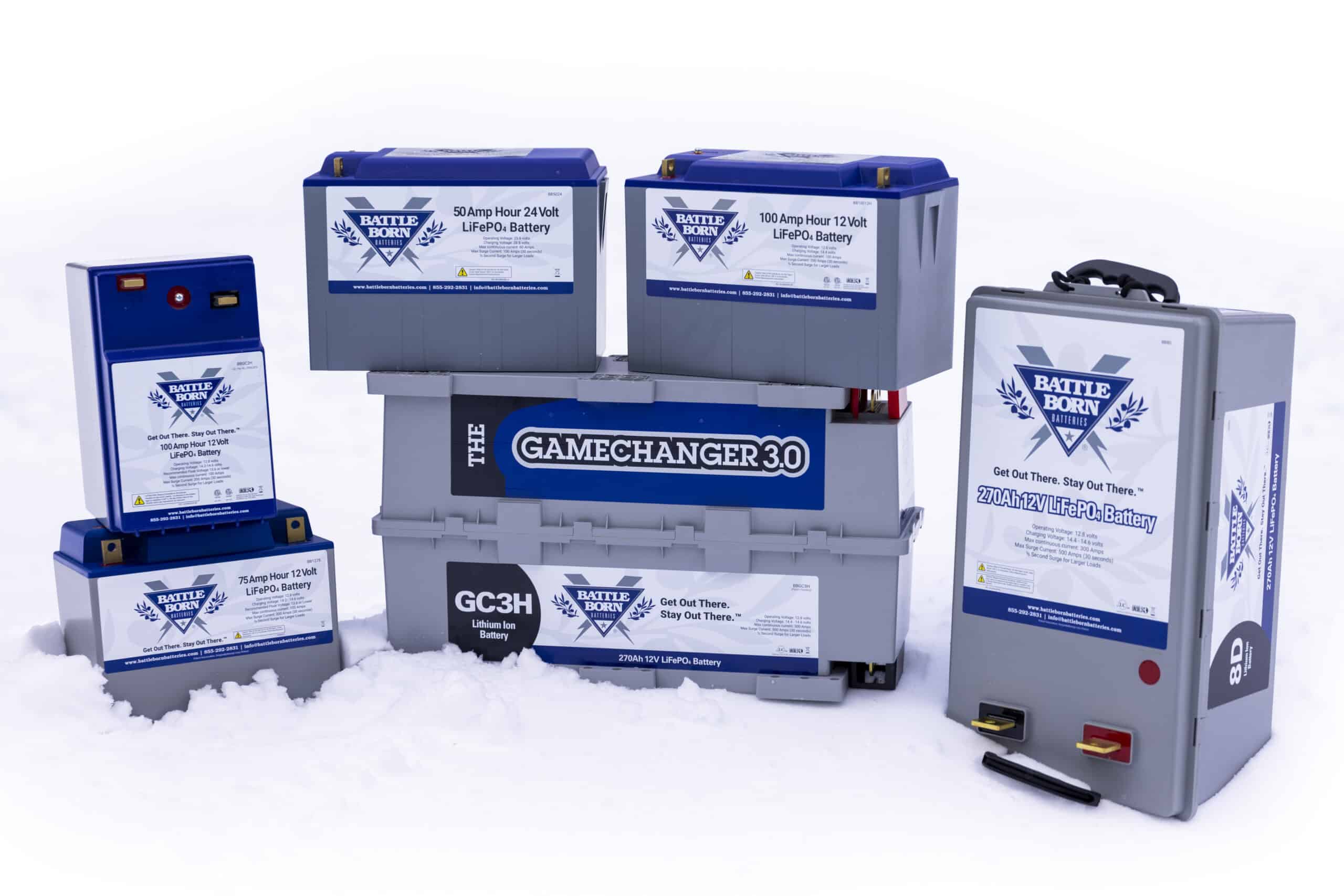
These LiFePO4 batteries use proprietary, low-draw technology to keep your battery warm and ready to charge, regardless of weather conditions. With stable chemistry and a built-in battery management system (BMS), you can rely on safe and reliable power during your all-weather adventures.
Our heated battery kits include an enable switch and all necessary wires to activate or deactivate the heated battery pack from anywhere in your system. The kit also has a Heat Battery Jumper wire that lets you activate the heated element directly from your battery.
We encourage you to check out our line of lithium-ion batteries assembled in the USA for your next RV, marine, or off-grid power need!
Building or upgrading an electrical system can be overwhelming, so we’re here to help. Our Reno, Nevada-based sales and customer service team is standing by at (855) 292-2831 to answer your questions!
Also, join us on Facebook, Instagram, and YouTube to learn more about how lithium battery systems can power your lifestyle, see how others have built their systems, and gain the confidence to get out there and stay out there.
We know that building or upgrading an electrical system can be overwhelming, so we’re here to help. Our Reno, Nevada-based sales and customer service team is standing by at (855) 292-2831 to take your questions!
Also, join us on Facebook, Instagram, and YouTube to learn more about how lithium battery systems can power your lifestyle, see how others have built their systems, and gain the confidence to get out there and stay out there.
Shop Best Sellers








Ask a technical specialist now at 855.292.2831
Stay in the Know
2 thoughts on “12V Battery Types: Which One Is For You?”
Hello,
Trying to figure out my power needs for a Mercedes Sprinter project. The van will be used in all weather climates from below freezing to very hot 100 degree plus. Hoping to be off grid and run air conditioner, induction cooktop, refigerator/freezer, roof vent and some lights. We plan to add a secondary alternator. I have been told a 24v system would be more efficient. I’m needing some help calculating needs and system requirements. Any help would be great as I’ve heard your batteries are great.
Thanks,
Andrew
Hi Andrew! Check out our battery calculator: https://battlebornbatteries.com/learn/calculator/ This is a great place to start when trying to determine the power needs of your system!